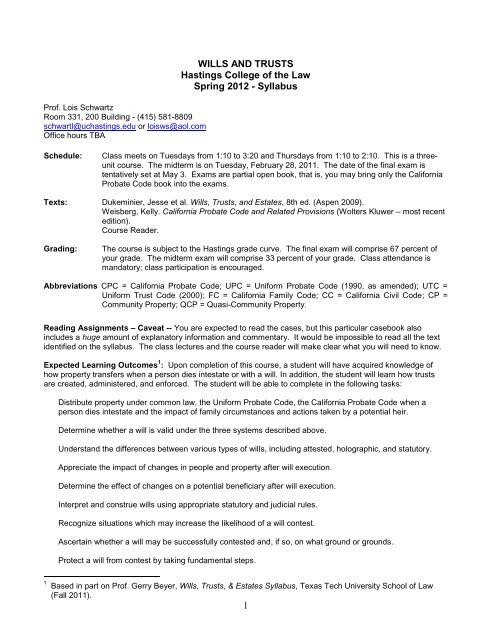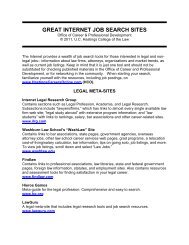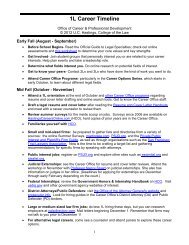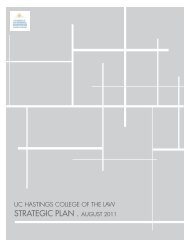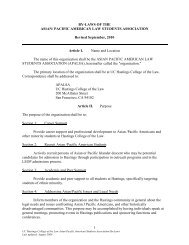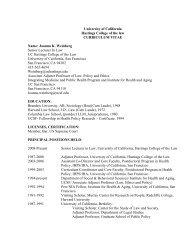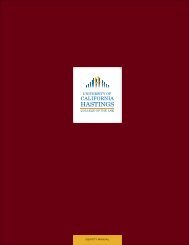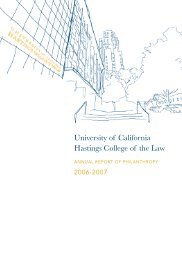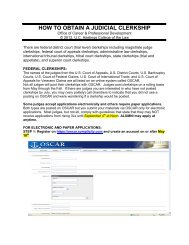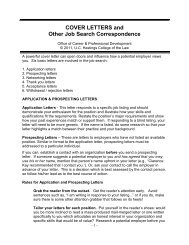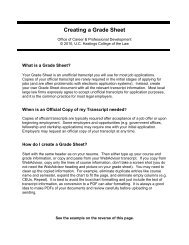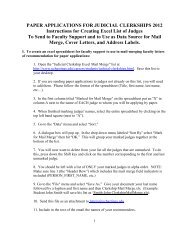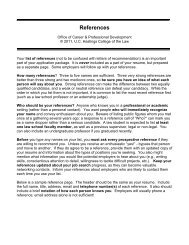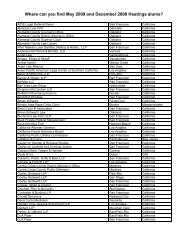WILLS AND TRUSTS - Hastings College of the Law
WILLS AND TRUSTS - Hastings College of the Law
WILLS AND TRUSTS - Hastings College of the Law
Create successful ePaper yourself
Turn your PDF publications into a flip-book with our unique Google optimized e-Paper software.
Pr<strong>of</strong>. Lois Schwartz<br />
Room 331, 200 Building - (415) 581-8809<br />
schwartl@uchastings.edu or loisws@aol.com<br />
Office hours TBA<br />
<strong>WILLS</strong> <strong>AND</strong> <strong>TRUSTS</strong><br />
<strong>Hastings</strong> <strong>College</strong> <strong>of</strong> <strong>the</strong> <strong>Law</strong><br />
Spring 2012 - Syllabus<br />
Schedule:<br />
Class meets on Tuesdays from 1:10 to 3:20 and Thursdays from 1:10 to 2:10. This is a threeunit<br />
course. The midterm is on Tuesday, February 28, 2011. The date <strong>of</strong> <strong>the</strong> final exam is<br />
tentatively set at May 3. Exams are partial open book, that is, you may bring only <strong>the</strong> California<br />
Probate Code book into <strong>the</strong> exams.<br />
Texts: Dukeminier, Jesse et al. Wills, Trusts, and Estates, 8th ed. (Aspen 2009).<br />
Weisberg, Kelly. California Probate Code and Related Provisions (Wolters Kluwer – most recent<br />
edition).<br />
Course Reader.<br />
Grading:<br />
The course is subject to <strong>the</strong> <strong>Hastings</strong> grade curve. The final exam will comprise 67 percent <strong>of</strong><br />
your grade. The midterm exam will comprise 33 percent <strong>of</strong> your grade. Class attendance is<br />
mandatory; class participation is encouraged.<br />
Abbreviations CPC = California Probate Code; UPC = Uniform Probate Code (1990, as amended); UTC =<br />
Uniform Trust Code (2000); FC = California Family Code; CC = California Civil Code; CP =<br />
Community Property; QCP = Quasi-Community Property.<br />
Reading Assignments – Caveat -- You are expected to read <strong>the</strong> cases, but this particular casebook also<br />
includes a huge amount <strong>of</strong> explanatory information and commentary. It would be impossible to read all <strong>the</strong> text<br />
identified on <strong>the</strong> syllabus. The class lectures and <strong>the</strong> course reader will make clear what you will need to know.<br />
Expected Learning Outcomes 1 : Upon completion <strong>of</strong> this course, a student will have acquired knowledge <strong>of</strong><br />
how property transfers when a person dies intestate or with a will. In addition, <strong>the</strong> student will learn how trusts<br />
are created, administered, and enforced. The student will be able to complete in <strong>the</strong> following tasks:<br />
Distribute property under common law, <strong>the</strong> Uniform Probate Code, <strong>the</strong> California Probate Code when a<br />
person dies intestate and <strong>the</strong> impact <strong>of</strong> family circumstances and actions taken by a potential heir.<br />
Determine whe<strong>the</strong>r a will is valid under <strong>the</strong> three systems described above.<br />
Understand <strong>the</strong> differences between various types <strong>of</strong> wills, including attested, holographic, and statutory.<br />
Appreciate <strong>the</strong> impact <strong>of</strong> changes in people and property after will execution.<br />
Determine <strong>the</strong> effect <strong>of</strong> changes on a potential beneficiary after will execution.<br />
Interpret and construe wills using appropriate statutory and judicial rules.<br />
Recognize situations which may increase <strong>the</strong> likelihood <strong>of</strong> a will contest.<br />
Ascertain whe<strong>the</strong>r a will may be successfully contested and, if so, on what ground or grounds.<br />
Protect a will from contest by taking fundamental steps.<br />
1 Based in part on Pr<strong>of</strong>. Gerry Beyer, Wills, Trusts, & Estates Syllabus, Texas Tech University School <strong>of</strong> <strong>Law</strong><br />
(Fall 2011).<br />
1
Understand why a person would elect to create a trust.<br />
Know <strong>the</strong> elements <strong>of</strong> a valid trust – settlor, trustee, beneficiary, corpus, and (sometimes) protector and <strong>the</strong><br />
different types <strong>of</strong> trusts.<br />
Determine whe<strong>the</strong>r a valid trust was created.<br />
Know how to limit <strong>the</strong> interest <strong>the</strong> settlor grants to <strong>the</strong> beneficiary.<br />
Understand <strong>the</strong> trustee’s fiduciary duties such as <strong>the</strong> standard <strong>of</strong> care and duty <strong>of</strong> loyalty.<br />
Determine <strong>the</strong> liability <strong>of</strong> a trustee in contract and tort contexts.<br />
Appreciate how a trustee must account to <strong>the</strong> beneficiaries.<br />
Explain how a trust may be altered by <strong>the</strong> court or <strong>the</strong> parties.<br />
Enforce trusts and obtain remedies.<br />
Understand <strong>the</strong> workings <strong>of</strong> trust bank accounts, resulting trusts, and constructive trusts.<br />
Continued . . .<br />
2
Week One: Tuesday, January 10 and Thursday, January 12<br />
Introduction: <strong>the</strong> power to transmit property at death.<br />
Dukeminier 8th edition Pages 1-38<br />
Key cases 8th ed. Hodel (p. 3): rights to transmit and receive property at death.<br />
Shapira (p. 28): right to condition inheritance.<br />
Relevant CA statutes<br />
Relevant UPC (1990)<br />
provisions<br />
Summary <strong>of</strong> probate procedure.<br />
Dukeminier 8th edition Pages 42-48<br />
CPC § 21105 (will passes all property and after-acquired property <strong>of</strong> testator)<br />
§ 2-602 (will may pass all property and after-acquired property <strong>of</strong> testator)<br />
Introduction to intestacy: shares <strong>of</strong> spouses, domestic partners, descendants, ascendants, collaterals.<br />
Dukeminier 8th edition<br />
Pages 71-97. Basic intestacy scheme.<br />
Week Two: Tuesday, January 17 and Thursday, January 19<br />
Intestacy: shares <strong>of</strong> spouses & domestic partners<br />
Dukeminier 8th edition Pages 71-86<br />
Key case<br />
Janus (p. 80). Period required for survival <strong>of</strong> spouse.<br />
Relevant CA statutes CPC § 6400 (property subject to intestacy provisions); 6401 (intestate share <strong>of</strong><br />
surviving spouse or domestic partner); 6402 (share not passing to surviving spouse<br />
or domestic partner); 6402.5 (portion <strong>of</strong> decedent’s estate passing to issue <strong>of</strong><br />
decedent’s predeceased spouse); 6404 (escheat); 220 (simultaneous death);<br />
221(exceptions); 222 (gift conditioned on survival <strong>of</strong> ano<strong>the</strong>r); 223 (joint tenants);<br />
224 (simultaneous death <strong>of</strong> insured and beneficiary).<br />
NOTE: CPC §§ 100-104 also govern distribution <strong>of</strong> community property at death<br />
but apply only when decedent dies on or after January 1, 1985. See especially §<br />
100 (CP) and § 101 (quasi-CP);<br />
Relevant UPC provisions § 2-101 (intestate estate); § 2-102 (share <strong>of</strong> spouse in common law state); § 2-102A<br />
(share <strong>of</strong> spouse in CP state); § 2-103 (share <strong>of</strong> heirs o<strong>the</strong>r than spouse); § 2-105<br />
(no taker); § 2-106 (representation).<br />
Intestacy: transfers to children<br />
Dukeminier 8th edition Pages 87-133<br />
Key cases<br />
Hall (p. 97) (adoption & dual inheritance); Minary (p. 103) (adoption <strong>of</strong> spouse);<br />
O’Neal (p. 109) (equitable adoption); Woodward (p. 118) (posthumous conception);<br />
In re Martin B., p. 126.<br />
Relevant CA statutes CPC §§ 240 (intestate distribution to issue by modern per stirpes rule); 245 (modern<br />
per stirpes distribution); 247 (per capita at each generation distribution); 249.5 (child<br />
conceived after death <strong>of</strong> genetic parent); 6406 (intestate share <strong>of</strong> half-blood<br />
relatives); 6407 (posthumous heirs); 6450 (adopted and nonmarital children); 6451<br />
(adoption & birth family); 6452 (inheritance by parents <strong>of</strong> children born out <strong>of</strong><br />
wedlock); 6453 (determination <strong>of</strong> natural parent); 6454 (right to inherit from foster or<br />
step-parent); 6455 (equitable adoption); FC 7610 (establishing parent-child<br />
relationship); 7611 (presumed natural fa<strong>the</strong>r); 7630 (paternity action); 7650<br />
(determining mo<strong>the</strong>r-child relationship).<br />
Relevant UPC provisions § 2-106 (representation); § 2-107 (half blood); § 2-108 (afterborn heirs); § 2-113<br />
(relationship to decedent thru 2 lines); § 2-114 (parent/child relationship); § 2-709<br />
(representation; per capita at each generation; per stirpes);<br />
3
Week Three: Tuesday, January 24 and Thursday, January 26<br />
Advancements against intestate share<br />
Dukeminier 8th edition Pages 133-136<br />
Key cases<br />
None<br />
Relevant CA statutes<br />
Relevant UPC provisions<br />
CPC §§ 6409 (advancement writing requirement).<br />
§ 2-109 (advancements)<br />
Guardianship, conservatorship, and o<strong>the</strong>r protections for minors.<br />
Dukeminier 8th edition Pages 136-140<br />
Key cases<br />
None<br />
Relevant CA statutes Statutes not required.<br />
Relevant UPC provisions UPC sections not required.<br />
Continued . . .<br />
Bars to inheritance: homicide; disclaimer.<br />
Dukeminier 8th edition Pages 145-157<br />
Key cases<br />
Estate <strong>of</strong> Mahoney (p. 145) (slayer statutes), Drye (pp. 155) (disclaimer).<br />
Relevant CA statutes<br />
Relevant UPC provisions<br />
CPC §§ 250-254 (disqualification for killer), § 259 (disqualification for elder abuse),<br />
§§ 282-283 (disclaimer).<br />
§ 2-801 (disclaimer); § 2-803 (effect <strong>of</strong> homicide).<br />
Week Four: Tuesday, January 31 and Thursday, February 2<br />
Wills: capacity & contests.<br />
Dukeminier 8th edition Pages 159-221<br />
Key cases Estate <strong>of</strong> Washburn (p. 159) (mental capacity <strong>of</strong> testator); Wilson v. Lane (p. 161)<br />
(mental capacity <strong>of</strong> testator); In re Strittmater (p. 169) (mental capacity); Breeden<br />
(p. 171) (mental capacity); Lipper (p. 193) (undue influence); In re Will <strong>of</strong> Moses (p.<br />
186) (undue influence); Puckett (p. 209) (fraud); Latham (p. 210) (duress); Schilling<br />
(p. 215) (tortious interference with expectancy).<br />
Relevant CA statutes<br />
Relevant UPC provisions<br />
CPC §§ 6100 (who may make a will); 6100.5 (persons not mentally competent to<br />
make will); 6104 (duress, menace, fraud, undue influence); 21350 & 21350.5<br />
(disqualified transferees); 21353 (disqualification if transfer fails – recipient treated<br />
as predeceased).<br />
§ 2-501 (who may make a will); § 2-517 (penalty clause <strong>of</strong> contest).<br />
Continued . . .<br />
4
Week Five: Tuesday, February 7 and Thursday, February 9<br />
Formalities <strong>of</strong> attested wills.<br />
Dukeminier 8th edition Pages 227 -267<br />
Key cases 8th ed. Stevens (p. 229) (formalities vs. intent <strong>of</strong> testator); Estate <strong>of</strong> Morea (p. 239)<br />
(bequest to witness); Pavlinko’s Estate (p. 246) (switched wills); In re Snide (p. 250)<br />
(reciprocal wills); In re Will <strong>of</strong> Ranney (p. 253) (substantial compliance with<br />
signature requirement); Estate <strong>of</strong> Hall (p. 259) (dispensing power based on<br />
testator’s intent).<br />
Relevant CA statutes CPC §§ 6110 (requirements for formal will – writing, signed, witnessed); 6112<br />
(witnesses – competency and interest); 6113 (laws determining validity <strong>of</strong> will);<br />
6105 (conditional will).<br />
Relevant UPC provisions § 2-502 (execution, witnessed wills, holographic wills – note 2008 revision to allow<br />
notarization as an alternative to two witnesses!); § 2-505 (who may witness)<br />
Week Six:<br />
Tuesday, February 14. No class on Thursday, February 16 (which is treated as a Monday)<br />
Formalities – Holographic wills; pre-printed form wills; statutory wills.<br />
Dukeminier 8th edition Pages 268-285<br />
Key cases 8th ed. Kimmel’s Estate (p. 269) (letter serving as will); Estate <strong>of</strong> Gonzales (p. 274) (preprinted<br />
will form); Estate <strong>of</strong> Kuralt (p. 280) (letter as will codicil).<br />
Relevant CA statutes<br />
Relevant UPC provisions<br />
CPC §§ 6111 (holographic wills); 6111.5 (extrinsic evidence permissible in ltd.<br />
cases to determine if document is a will); 6223 (CA statutory wills). Oral wills, in<br />
contrast, are not recognized in California.<br />
§ 2-502 (execution, witnessed wills, holographic wills); § 2-503 (writings intended as<br />
wills); § 2-506 (rejecting oral wills)<br />
Revocation and revival<br />
Dukeminier 8th edition Pages 286-307<br />
Key cases<br />
Harrison (p. 287) (lost will); Thompson (p. 290) (requirements for revocation);<br />
LaCroix (p. 295) (dependent relative revocation [DRR] and revival); Alburn (p. 300)<br />
(DRR).<br />
Relevant CA statutes<br />
Relevant UPC provisions<br />
CPC §§ 6120 (revocation by subsequent will or physical act); 6121 (revocation <strong>of</strong><br />
duplicate will); 6122 (revocation by dissolution <strong>of</strong> marriage); 6122.1 (revocation by<br />
termination <strong>of</strong> domestic partnership); 6123 (revival <strong>of</strong> revoked will); 6124<br />
(presumption <strong>of</strong> revocation).<br />
§ 2-507 (revocation by writing or act); § 2-508 (revocation by changed<br />
circumstances); § 2-509 (revival <strong>of</strong> revoked will); § 2-804 (revocation by divorce).<br />
Continued . . .<br />
5
Week Seven: Tuesday, February 21 and Thursday, February 23<br />
Will formation: integration; incorporation by reference; republication by codicil; acts <strong>of</strong> independent<br />
significance; extrinsic evidence & mistake; contracts related to a will.<br />
Dukeminier 8th edition Pages 307-334<br />
Key cases<br />
Clark (p. 310) (incorporation by reference); Johnson (p. 317) (republication <strong>of</strong> will by<br />
codicil); Via (p. 329) (contracts related to will).<br />
Relevant CA statutes<br />
Relevant UPC provisions<br />
CPC § 6130 (incorporation by reference); § 88 (will includes codicil); § 6131 (acts <strong>of</strong><br />
independent significance); § 6111.5 (extrinsic evidence); CCP § 1856 (parol<br />
evidence); CPC § 21700 (contract to make will or o<strong>the</strong>r instrument).<br />
§ 2-510 (incorporation by reference); § 2-512 (events <strong>of</strong> independent significance);<br />
§ 2-513 (separate writing identifying bequest <strong>of</strong> tangible property); § 2-514<br />
(contracts concerning succession).<br />
Thursday, February 23: In-class review for midterm exam<br />
TUESDAY, FEBRUARY 28: MIDTERM EXAM<br />
PARTIAL OPEN BOOK; YOU MAY BRING THE CODE BOOK ONLY.<br />
Week Eight: Tuesday, February 28 [MIDTERM EXAM] and Thursday, March 1<br />
Thursday, March 1. Non-probate transfers: will substitutes and revocable trusts.<br />
Will substitutes allow <strong>the</strong> decedent to pass property at death by means o<strong>the</strong>r than a will. Alternatives or<br />
supplements to a will include but are not limited to life insurance policies, payable-on-death accounts, pension<br />
accounts, bank and stock accounts, revocable inter vivos trusts, and joint tenancy, all <strong>of</strong> which allow<br />
“inheritance” by right <strong>of</strong> designation or survivorship.<br />
Dukeminier 8th edition Pages 393-403<br />
Key case<br />
Farkas (p. 398) (intervivos revocable trust).<br />
Relevant CA statutes<br />
Relevant UPC provisions<br />
CPC §§ 5000 (P.O.D. accts); 5020 (transfer <strong>of</strong> community property); 5301 (multiple<br />
party accts); CPC §§ 5302 (rights <strong>of</strong> survivor to joint acct); 6300 (pour-over wills);<br />
Civil Code § 683-683.2 (joint tenancy); Civil Code § 682.1 (community property with<br />
right <strong>of</strong> survivorship).<br />
§ 2-706 (construction <strong>of</strong> life insurance, retirement plan, acct with POD designation,<br />
etc.); § 2-511 (pour-over provisions in wills).<br />
Continued . . .<br />
6
Week Nine:<br />
No class 3/6 or 3/8 -- SPRING BREAK<br />
Week Ten: Tuesday, March 13 and Thursday, March 15<br />
General rules <strong>of</strong> judicial interpretation and construction <strong>of</strong> wills<br />
CPC § 21102<br />
CPC § 21120<br />
CPC § 21120<br />
CPC § 21122<br />
Intention <strong>of</strong> testator is controlling.<br />
Every expression in a will should be given effect if possible.<br />
Preference should be given to an interpretation that avoids intestacy.<br />
Words <strong>of</strong> a will are to be given <strong>the</strong>ir ordinary meaning unless a different intention<br />
can be ascertained.<br />
Judicial construction <strong>of</strong> wills: latent and patent ambiguities; mistake.<br />
► Patent ambiguities are apparent on <strong>the</strong> face <strong>of</strong> <strong>the</strong> will; latent ambiguities are not apparent.<br />
► Mistake applies to: (1) omission; (2) execution; (3) description; (4) inducement.<br />
Dukeminier 8th edition Pages 335-357<br />
Key cases<br />
Mahoney (p. 336) (judicial use <strong>of</strong> plain meaning <strong>of</strong> language in will); Arnheiter (p.<br />
343) (judicial willingness to strike mistaken term); Erickson (p. 345) (judicial<br />
reformation <strong>of</strong> will to correct mistake).<br />
Relevant CA statutes CPC § 6111.5 (admissibility <strong>of</strong> extrinsic language to determine meaning).<br />
Relevant UPC provisions UPC § 2-805 (2008)<br />
Week Eleven: Tuesday, March 20 and Thursday, March 22<br />
Judicial construction <strong>of</strong> wills: death <strong>of</strong> beneficiary preceding death <strong>of</strong> testator.<br />
Dukeminier 8th edition Pages 358-379<br />
Key cases<br />
Estate <strong>of</strong> Russell (p.359) (predeceased canine beneficiary); Ruotolo (p. 367) (lapse<br />
<strong>of</strong> bequest); Dawson (p. 376) (effect <strong>of</strong> death on class gift).<br />
Relevant CA statutes CPC §§ 21109 (failure to survive decedent); 21110 (anti-lapse statute); 21111<br />
(effect <strong>of</strong> failed transfer).<br />
Relevant UPC provisions § 2-603 (anti-lapse statute); § 2-604 (failure <strong>of</strong> testamentary provision).<br />
Judicial construction <strong>of</strong> wills: changes in property after execution <strong>of</strong> will.<br />
► Changes in property after <strong>the</strong> will is executed may require application <strong>of</strong> <strong>the</strong> following doctrines: ademption,<br />
satisfaction, abatement, and exoneration.<br />
► Note also that testamentary gifts <strong>of</strong>ten must be classified as specific, general, demonstrative, or residuary for<br />
purposes <strong>of</strong> applying <strong>the</strong>se doctrines.<br />
Dukeminier 8th edition Pages 380-392<br />
Key case<br />
In re Estate <strong>of</strong> Anton (p. 381) (ademption by extinction).<br />
Relevant CA statutes<br />
Relevant UPC provisions<br />
CPC §§ 12002 (specific devises <strong>of</strong> real property); 21117 (specific, general, and<br />
demonstrative gifts); 21131 (no right <strong>of</strong> exoneration for loan on property); 21132<br />
(ademption – change in form - entitlement to posthumous stock splits & dividends);<br />
21133 (ademption = right to unpaid proceeds); 21135 (satisfaction – deduction from<br />
testamentary gift); 21402 (order <strong>of</strong> abatement); 21403 (abatement within class);<br />
21403 (abatement within a class); 21612 (abatement to satisfy omitted spouse’s<br />
share).<br />
§ 2-609 (ademption by satisfaction); 2-607 (non-exoneration); 2-606 (nonademption<br />
<strong>of</strong> specific devises); 2-605 (accession to increased value in securities);<br />
2-606 (1997) (nonademption <strong>of</strong> specific devises)..<br />
7
Week Twelve: Tuesday, March 27 and Thursday, March 29<br />
Restrictions on <strong>the</strong> power <strong>of</strong> disposition: general family protections in California<br />
CPC §§ 6540 et seq.<br />
CPC §§ 60 et seq.<br />
CPC §§ 6501 et seq.<br />
Family allowance pending administration <strong>of</strong> estate<br />
Homestead exemption<br />
Personal property exemption<br />
Restrictions on <strong>the</strong> power <strong>of</strong> disposition: rights <strong>of</strong> surviving spouse.<br />
Dukeminier 8th edition Pages 469-515<br />
Key cases<br />
Estate <strong>of</strong> Cooper (p. 483 note) – application <strong>of</strong> spousal rights to same-sex<br />
relationship Estate <strong>of</strong> Cross (p. 484) (spousal election <strong>of</strong> intestate share over<br />
provision in will); Sullivan (p. 488) (extension <strong>of</strong> elective share to non-probate<br />
transfer); Reece (p. 503) (premarital waiver <strong>of</strong> spousal rights)<br />
Relevant CA statutes<br />
Relevant UPC provisions<br />
CPC §§ 100 (disposition <strong>of</strong> CP upon death); 101 (disposition <strong>of</strong> quasi-CP upon<br />
death); 140-147 (waiver <strong>of</strong> spousal rights); FC § 1615 (premarital arrangements);<br />
CPC § 21610 (share <strong>of</strong> omitted spouse); 21611 (when omitted spouse does not<br />
receive share); 21612 (property to satisfy omitted spouse’s share); 6560 (share <strong>of</strong><br />
omitted spouse when decedent died before 1/1/98).<br />
§ 2-202(a)(elective share <strong>of</strong> surviving spouse grows with years <strong>of</strong> marriage;<br />
augmented estate includes non-probate transfers), § 2-301 (entitlement <strong>of</strong> spouse –<br />
premarital will); § 2-213 (waiver <strong>of</strong> right to elect).<br />
Week Thirteen: Tuesday, April 3 and Thursday, April 5<br />
Restrictions on <strong>the</strong> power <strong>of</strong> disposition: rights <strong>of</strong> omitted issue.<br />
Dukeminier 8th edition Pages 521-539<br />
Key cases<br />
Lambeff (p. 522) (family maintenance statute); Gray (p. 528) (unintentional<br />
omission); Kidwell (p. 536) (pretermitted heir).<br />
Relevant CA statutes<br />
Relevant UPC provisions<br />
CPC §§ 6540 (family allowance during administration <strong>of</strong> estate); 21620 (share <strong>of</strong><br />
omitted child); 21621 (when omitted child does not receive share); 21622 (unknown<br />
child or child believed dead); 21623 (property to satisfy omitted child’s share; 6570-<br />
6573 (share <strong>of</strong> omitted child when decedent died before 1/1/98).<br />
UPC § 2-302 (omitted children).<br />
Trusts: creation & characteristics <strong>of</strong> different types <strong>of</strong> trusts<br />
Dukeminier 8th edition Pages 543-544, 547-595<br />
Key cases<br />
Jimenez (p. 558) (beneficiary’s demand that trustee provide accounting); Hebrew<br />
University (p. 563, 566) (characterization <strong>of</strong> failed donation as trust); Unthank (p.<br />
569) (characterization <strong>of</strong> donative promise as trust declaration); Speelman (p. 572)<br />
(trust corpus based on expectancy); Clark (p. 579) (necessity <strong>of</strong> ascertainable<br />
beneficiaries); Searight’s Estate (p. 582) (trustee’s obligations in honorary trust);<br />
Olliffe (p. 593) (secret and semi-secret trusts).<br />
Relevant CA statutes CPC §§ 82 (creation <strong>of</strong> trust); 15204 (trust for general purpose); 15205 (designation<br />
<strong>of</strong> beneficiary).<br />
Relevant UTC provisions<br />
§ 401 (methods <strong>of</strong> creating trust); § 402 (requirements for creation); § 404 (trust<br />
purposes); § 407 (oral trust); § 408 (trust for care <strong>of</strong> animal); § 409 (ascertainable<br />
beneficiary).<br />
8
Week Fourteen: Tuesday, April 10 & Thursday, April 12<br />
Trusts: rights <strong>of</strong> beneficiaries and creditors<br />
Dukeminier 8th edition Pages 597-631<br />
Key cases Marsman (p. 598) (right <strong>of</strong> beneficiary to distribution from trust); Scheffel (p. 616)<br />
(spendthrift trusts as shields against creditors); FTC v. Affordable Media (p. 628)<br />
(<strong>of</strong>fshore trust).<br />
Relevant CA statutes<br />
Relevant UTC provisions<br />
CPC §§ 15300-15309 (spendthrift trusts & restraint on transfer <strong>of</strong> income and/or<br />
principal), including but not limited to 15302 (education or support trusts); 15303<br />
(discretionary trusts); 15304 (protection <strong>of</strong> settlor under spendthrift trust); 15305<br />
(claims against trust for child and spousal support); 15305.5 (judgment awarding<br />
restitution or damages for felony); 15306 (liability <strong>of</strong> spendthrift trust for public<br />
support <strong>of</strong> beneficiary or spouse or minor child).<br />
§ 501 (rights <strong>of</strong> beneficiary’s creditor or assignee); § 502-503 (spendthrift provision<br />
& exceptions); § 504 (discretionary trusts); §§ 601 et seq. (revocable trusts).<br />
Modification & termination <strong>of</strong> trusts<br />
Dukeminier 8th edition Pages 641-656<br />
Key cases<br />
In re Trust <strong>of</strong> Stuchell (p. 643) (modification); In re Riddell (p. 645) (special needs<br />
trust); In re Estate <strong>of</strong> Brown (p. 653) (termination).<br />
Relevant CA statutes CPC §§ 15211 (duration <strong>of</strong> trust for noncharitable purpose); 15212 (duration <strong>of</strong> trust<br />
for care <strong>of</strong> domestic animal or pet).<br />
Relevant UTC provisions §§ 410-412 (modification or termination); § 415 (reformation to cure mistake); § 706<br />
(removal <strong>of</strong> trustee).<br />
Tuesday, April 17:<br />
Last Day <strong>of</strong> Class -- one hour<br />
Charitable trusts<br />
Dukeminier 8th edition Pages 751-787<br />
Key cases<br />
Shenandoah Bank (p. 752) (charitable purpose required); In re Neher (p. 761) (cy<br />
pres); Smi<strong>the</strong>rs (p. 776) (supervision <strong>of</strong> charitable trust);<br />
Relevant CA statutes<br />
Relevant UTC provisions<br />
§§ 16100 (charitable trusts defined by Internal Revenue Code); 4947 (nonexempt<br />
charitable trusts); 21100 (charitable trusts in educational institutions); 15205 (no<br />
requirement for designation <strong>of</strong> beneficiary);<br />
§ 405 (standing); § 413 (modification under doctrine <strong>of</strong> cy pres).<br />
Good luck on your final exam!<br />
Tentative date May 3<br />
Have a great summer!<br />
9


